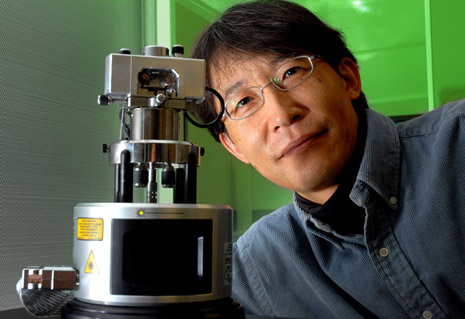FAYETTEVILLE, Ark. – Assembly of nanostructures using DNA may lead to the production of new materials with a wide range of applications from electronics to tissue engineering. Researchers in the Institute for Nanoscience and Engineering at the University of Arkansas have produced building blocks for such material by controlling the number, placement and orientation of DNA linkers on the surface of colloidal nanoparticles.
Their work is featured as the “hot paper” in the current issue of Angewandte Chemie International Edition, the weekly scientific journal of the German Chemical Society.
“We have demonstrated a strategy to place ‘DNA linkers’ on a nanoparticle at specific angles relative to each other so that we may produce building blocks with well-defined arrangements of DNA in all dimensions,” said Jin-Woo Kim, professor of biological engineering. “The specific number and orientation of DNA strands on the nanoparticles allow greater control over the ultimate shape of nanostructures.”
DNA linkers are areas on the nanoparticles that functionally allow connection with other nanoparticles. In this case, connection is achieved through a type of DNA hybridization reaction.
The simple and sustainable strategy involves attaching strands of DNA to functionalized nanoparticles one strand after the other rather than all at the same time. The nanoparticle with the first strand serves as the starting material for the second strand. The nanoparticle with these two strands together serves as the starting material for the third, and so on. In addition to facilitating greater control over the shape of the structure, assembling in this sequential manner renders the process more reproducible and scalable, which helps with the assembly of complex, hybrid nanoscale architectures at all scales and in all dimensions.
The building blocks, which the researchers call “nBLOCKs,” remained stable under volatile conditions. They exhibited chemical stability and water solubility during ligand replacement reactions. There were no apparent changes in physical and chemical properties when the building blocks were stored at 4 degrees Celsius for at least a month. Such promising stability shows high potential for their practical application. The researchers continue working on further optimizing their physical and chemical stability.
Kim said the building strategy can be generalized for other types of nanoparticles, meaning that construction of other types of building blocks with specific, desired functions may be achieved. The technology has the potential to transform many fields of research, including biology, medicine, chemistry, physics, materials science and engineering.
The research was supported by the National Science Foundation, the University of Arkansas Division of Agriculture and the Arkansas Biosciences Institute.
The work was a multidisciplinary, collaborative effort with Russell Deaton, professor of computer science and computer engineering. Jeong-Hwan Kim, postdoctoral associate at the Bio/Nano Technology Laboratory, also made a significant contribution to the project.
Jin-Woo Kim is a professor in the Dale Bumpers College of Agricultural, Food and Life Sciences and the College of Engineering. He works in the Institute for Nanoscience and Engineering at the University of Arkansas and directs the Bio/Nano Technology Laboratory.
Topics
Contacts
Jin-Woo Kim, professor
Biological and Agricultural Engineering
479-575-3402,
Matt McGowan, science and research communications officer
University Relations
479-575-4246,
